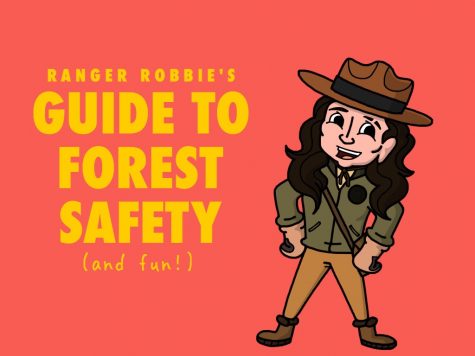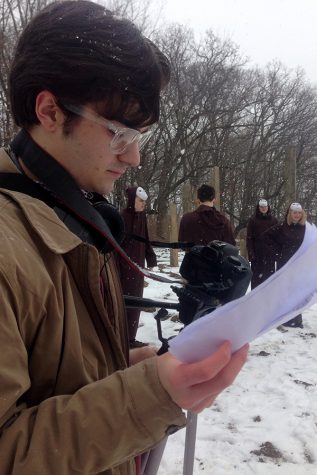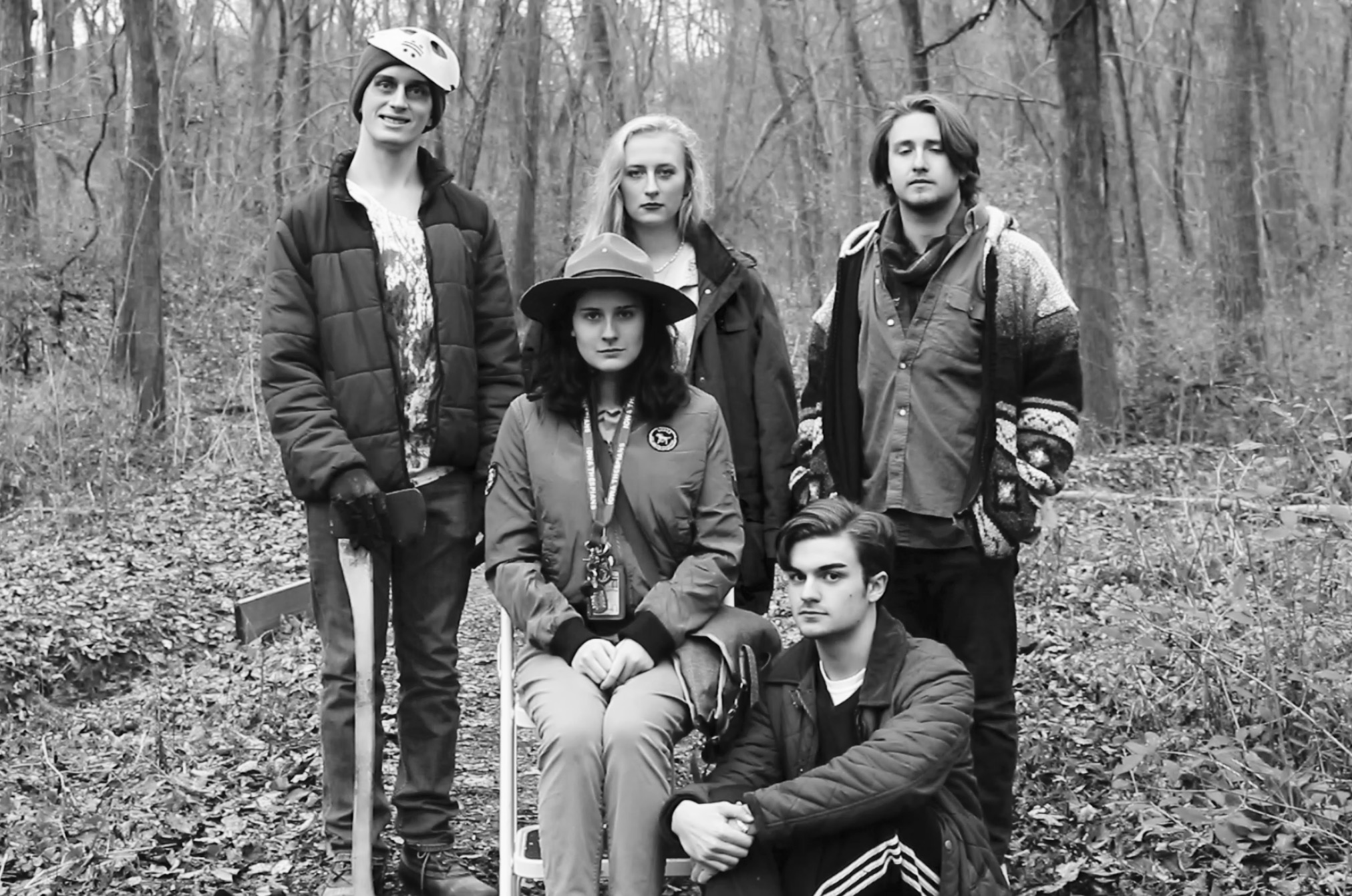Your donation will support the student journalists of Iowa City High School. For 2023, we are trying to update our video and photo studio, purchase new cameras and attend journalism conferences.
Reflections on ‘Ranger Robbie’
AJ Boulund '17 and Deckard Finley ‘17 created a mock forest safety film, starring Addie Bass ’17, for the spring Speech season.
February 7, 2017
Snowflakes fall delicately on a cold Saturday morning as speech members dressed in robes and masks trek along one of the winding trails of the Iowa City Forest Preserve. The speech members are a part of the City High Large Group Speech Short Film cast, and they are at the Harvest Preserve to film the final scene of “Ranger Robbie’s Guide to Forest Safety (And Fun!)”, written and directed by AJ Boulund ‘17 and Deckard Finley ‘17.
Their production follows the earnest park ranger Ranger Robbie as she tries to teach viewers about park safety, but keeps stumbling upon increasingly terrible events such as an axe murder, a hostage negotiation, and a cult sacrifice. This snowy scene requires a full cast of cult members, cameraman Cliff, Ranger Robbie, and an Ample Virgin.

The title slide of the short film.
Sofie Lie ‘17 plays the Ample Virgin, a cult sacrifice covered only in a white dress and tights. She bundles up briefly in between shots to stay warm.
Lie’s performance is not the only instance of a cast member enduring harsh conditions when filming: Anna Norman-Wikner ‘17 shares this hardship. She plays a woman attempting to escape an axe-wielding Fred Ogilvie ‘17. In this scene, Norman-Wikner falls repeatedly onto the muddy trails of Hickory Hill park during 35 degree weather.
“I didn’t wear shoes for a lot of my filming, so that was kind of interesting,” said Norman-Wikner. “It was really cold and dirty. I had mud all over my feet. It was fun!”
The arduous process of making a film begins with an idea. For this film in particular, the film’s co-director Deckard Finley ‘17 had the initial spark.
“I got inspiration for this film from watching dated info VHS tapes that would see in a guidance class or something,” said Finley.
This theme stood out at competitions, and it was broadly accepted for its uniqueness. Boulund and Finley’s film received a Division 1 rating at the first speech competition, and will be advancing to state. At speech competitions, most short films submitted cover issues such as suicide or how ‘technology is bad for you’.
“The majority of short films are low quality,” said Addie Bass ‘17. “They try to tackle too many issues in a five minute period.”
Boulund and Finley faced challenges when creating this film, but writing did not seem to be one of them.
“Writing Ranger Robbie was pretty easy,” said Boulund. “Deckard came up with the tone and the voice of the film. I did most of the ground work with writing the script. I wrote the entirety of the cult scene and most of the mob scene.”
Filmmaking takes a lot of time, dedication, and commitment, not just from the cast, but from everyone involved to create a great product. Boulund spent about 40 hours just editing footage he shot, and at least four hours of filming the footage he edited. Boulund and Finley spent two whole days planning out their shoot, because some scenes had a limited time window to film in because of weather restrictions and daylight.

Co-director AJ Boulund ’17 looks over the manuscript.
Students involved in Boulund and Finley’s film were given an opportunity to experience a different dimension of drama. The entire film was shot without a proper microphone, so the cast had to redub their lines. To redub a line means to re-record a line exactly as it is spoken so it seems like the actor is speaking the recording. This is usually done to achieve higher sound quality and clarity.
“I’ve never had to do a voice dub before,” said Norman-Wikner. “I had to do all the breathing and weird noises in the background all over again.”
Though a person acting on film and camera is essentially doing the same thing, there are a few key differences that distinguish one from another. Addie Bass, a first time film actress, describes her experience:
“It’s just a different dynamic. There’s much more precision needed for acting on camera,” said Bass. “Every expression you make, every movement you make is captured by the camera.”
There is the obvious difference when it comes to acting on film versus acting on camera, which is the fact that you’re acting in front of a camera or on a stage in front of a live audience. Though film requires more precision, theatre presents other challenges.
“Performing for a live audience is hands down more difficult,” said Bass. “If you mess up during a live performance, there’s no control over that. You can’t say ‘okay cut, let’s do that again’. You just have to keep going and power through. If I forget a line while filming, then I just say, ‘okay sorry guys let’s start over’. Then the best take can be used, versus at a performance, where you just have to roll with it.”
Though there are several differences between film and theatre acting, both share an arduous process of creation and presentation. Because of this, they also share the satisfaction of creating something special and unique that can not be duplicated.
“My favorite part about filming was watching it all come together,” said Norman-Wikner.
When a project is finished, one must decide what to do with the product. Since short film is technically a part of City High Speech, Boulund and Finley are submitting their film to speech competitions. Boulund shares his plans for the film after speech competition season is over.
“I’ll submit it to City High Film Fest, maybe put it on Youtube, maybe just keep it in a drawer and never show it again.”
